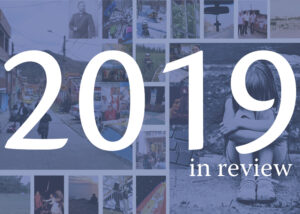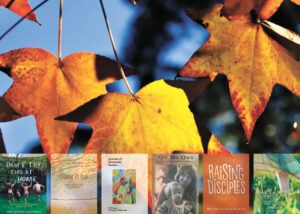‘This is our church’
Re: “How to talk about money at your church,” Sept. 30, page 10.
I read this Viewpoint piece, which I thought may give me insight into the responsible use of my resources. But Lori Guenther Reesor was actually serious about the church bragging about supporting the church preschool class, the regional church administration, buying hymn books for the church, and pastoral care for the church members.
Remember, our governments have granted churches relief from property taxes, and they allow us to get tax-deductible receipts for “church” work. Our governments, therefore, expect us to do good to those around us as part of this agreement.
What is the work that Jesus requires of us? Sociologist Tony Campolo says the church is the only club that is not for its members. Guenther Reesor should have been able to present stories of church members feeding the poor, supporting the widows and single parents, supporting the lonely, cutting the neighbour’s lawn, supporting drug rehab, and more.
I have never written in before because I rarely read your publication. In my opinion, it often reports on stories like this that have little relevance to the world we are currently living in. Also, I rarely attend our Mennonite church anymore, after being a member for 35 years, as it has the same illness that this magazine represents.
Instead, for the past seven years, using our resources, my wife and I visit with, and prepare a meal for, our local homeless folks, who range from 75-year-old grandparents to teenage drug addicts, on Sunday nights. This relationship often extends into the following week, to help with needs that we see on these evenings. We do harm reduction, and supply socks, gloves and whatever else we can afford to pass on to these friends of ours. This is our church.
—David Wall, Fort Langley, B.C.
Mennonite church ‘has come a long way’
Re: “Queer hymns now online,” Aug. 19, page 35.
The Songs for the Holy Other hymnal does justice in multiple ways.
Cedar Klassen’s love of hymns is honoured. The collection of hymns helps affirm the spiritual integrity of the LGBTQ+ community. The music also tells the story of religious and parental injustice where hard hearts leave painful scars.
At age 84, I’m starting to slow down, but I can still recognize that the Canadian Mennonite church has come a long way forward from my time as a member of the Mennonite Voluntary Service of Toronto in 2005-06.
—Jerry Kahlert, West St. Paul, Minn.
Enough is enough when it comes to sharing time
I have a concern to express regarding our Sunday morning worship services, where many congregations have a “sharing” or “prayer and praise” time.
We, as a people, need to learn to know what to share, how much to share and how long to share. In today’s age of privacy, the church fails miserably regarding privacy matters. I don’t need to know all the “gory and bloody” details of someone’s illness, injury, medical emergency or personal matter. I most certainly don’t need to know these details of Bobby-Sue’s friend Ellie whose uncle’s friend had this experience.
I could go on, but then I would be sharing too much of my concern.
No matter how concerned we are of their plight of others, God is also aware of them and their plight. If we feel the need to ask for extra prayer for the person or situation, all we need to say is, “Please remember Sven in your prayer.”
God knows Sven’s needs, and those closest to him know what is happening; all we need to do is ask for prayer for healing, strength, humility or whatever we think is needed for him. That’s it. No details, no waxing eloquent for the reason.
We also can’t go on naming people we do or don’t know without their permission. That’s the law.
We need to be cautious that our prayer time is prayer time, not gossip time or a race to let people know just how much we know.
You are free to agree or disagree with me; that’s your choice. I have nothing further to say.
—Eric Froese, Didsbury, Alta.
Presentation warns of environmental degradation by Bolivian Mennonites
On Oct. 15, I attended a presentation on the Mennonites in Bolivia given by Abe Janzen, a former director of Mennonite Central Committee (MCC) Alberta, and I came away deeply concerned and very upset.
The Mennonite community in Bolivia has been expanding at a rapid rate, in part by people embracing the Mennonite philosophy and by population growth from large families. Their large families are a concern, but I will leave that alone.
Of greater concern was that most of the young people want to follow an agrarian lifestyle. In itself, there is nothing wrong with this occupational choice. But land in Bolivia is limited, and so they must acquire more and more marginal land.
This land is unsuitable for cultivation, so it is cleared of rain forest and used for cattle grazing. Also, they are clearing land up the mountain slopes for cultivation. This has devastating effects on the environment.
Couple this with their belief that it is sacrilegious to use rubber tires, so they put steel wheels on their tractors and combines. Steel wheels are very detrimental, as they compact the soil and promote erosion. Their agricultural practices are exploiting the land, leaching the soils and destroying rain forest crucial to the welfare of the world.
Canada and other countries have condemned these agricultural practices and have offered funding to curb this devastation.
Is the Canadian government aware that the Mennonite community in Canada is providing financial assistance or endorsing these practices?
Maybe MCC should consider helping Bolivian Mennonites change their course. I certainly hope that none of my donations are going to Bolivia!
—Peter Kroeger, Calgary








Leave a Reply
You must be logged in to post a comment.